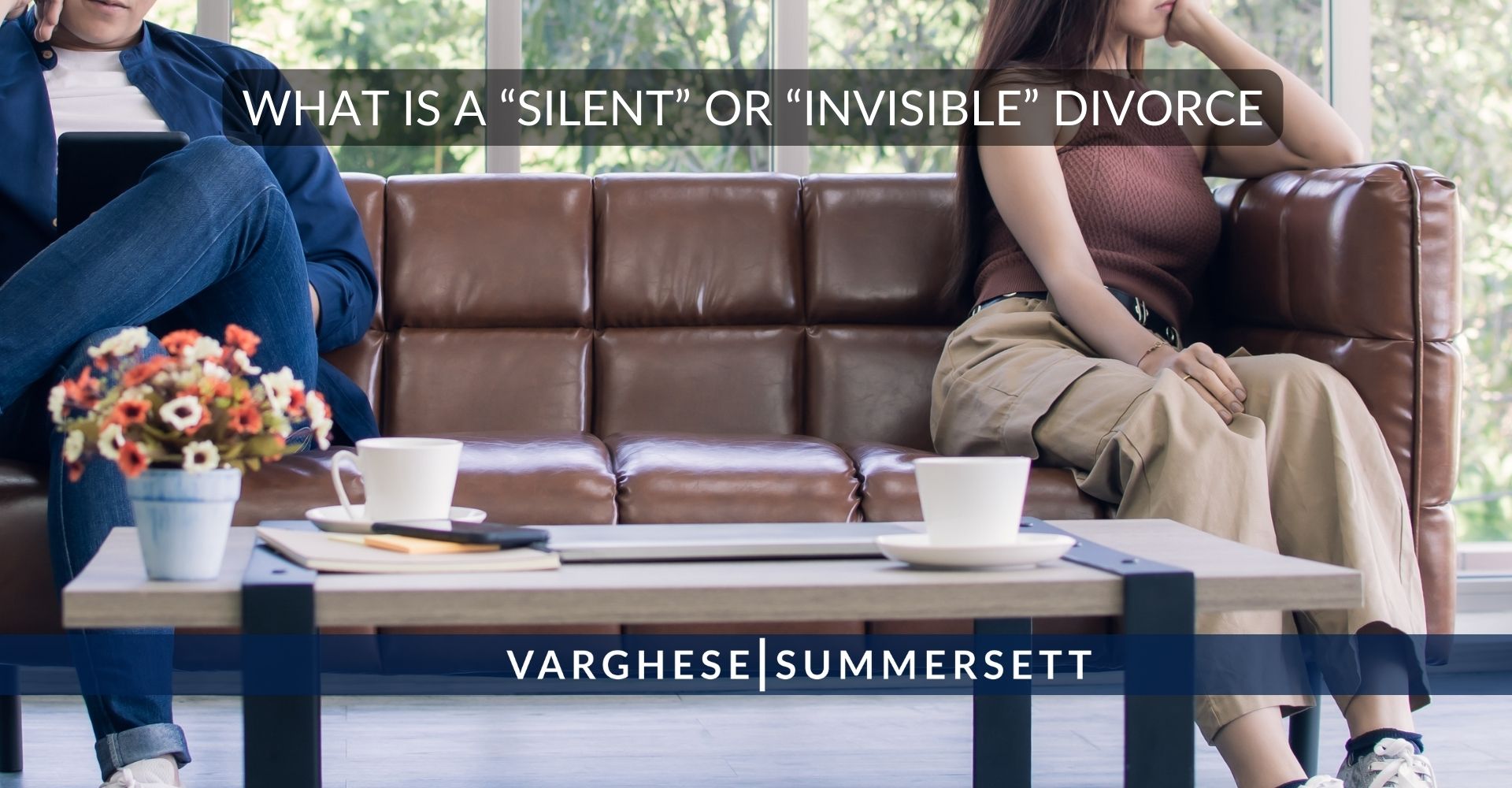Silent Divorce - When Closeness Fades Quietly
Sometimes, a marriage can feel like it is slowly drifting apart, even if there are no big arguments or loud fights. It is a bit like two ships passing in the night, sharing the same waters but not truly connecting. This quiet distance, this slow pulling away, is something many couples experience without really putting a name to it.
This feeling of being far away from your partner, even when you share a home, might be a sign of what people call a "silent divorce." It is a situation where the emotional ties that once held a couple together begin to loosen, making the relationship feel more like a roommate arrangement than a partnership built on love and closeness. You might be curious, so to speak, if this is happening to you or someone you know.
This article will help you make sense of what a silent divorce truly means, what things to look for, and why couples might end up in such a spot. We will also touch on how you might try to bring back that lost connection or, perhaps, when it is time to think about other paths. We will, very gently, explore the quiet signs of emotional separation and what might be done about them.
Table of Contents
- What is a Silent Divorce, Really?
- How Can You Spot the Signs of Silent Divorce?
- Why Do Couples Choose a Silent Divorce?
- What Are the Hidden Costs of Silent Divorce?
- How Does a Silent Divorce Differ from a Traditional Split?
- Reconnecting or Moving On From Silent Divorce
- Seeking Help for a Silent Divorce
- When to Consider a Legal Divorce From a Silent Divorce
What is a Silent Divorce, Really?
A silent divorce, you know, is a bit of a tricky thing because it is not a legal term. It describes a situation where a couple stays married in the eyes of the law, and they often still live in the same house, but their emotional bond has pretty much disappeared. It is like they are together on paper and in person, but their hearts and minds have gone separate ways. Moir, someone who knows a lot about these things, said that "a silent divorce is when you’re not legally separated, but you’re definitely emotionally, mentally and almost to a certain point physically removed, too, from your spouse." This kind of split happens without anyone really noticing it from the outside, which is why it gets called "silent."
This quiet separation, you see, is also known as an emotional divorce. It is a slow, often unobserved breaking apart between two people who once felt so close. The warmth, the affection, and the ties that once held them as a couple just slowly wear away. They end up feeling more like people who share a living space than two individuals connected by deep feelings. It is a gradual process, and that, too, is part of why it can go unseen for quite a while. Couples in this spot might feel quite alone and a bit resentful, even though they are still together.
How Can You Spot the Signs of Silent Divorce?
Finding the signs of a silent divorce can be a real challenge, as the things to look for are often not very obvious and they show up little by little over time. There might not be any loud disagreements or outward signs of trouble, at least not for others to see. But, you know, inside the relationship, there is just not much happening. The connection feels thin, and the energy that once made the partnership lively is just gone. Here are some things that might suggest a silent divorce is taking hold.
One clear sign of a silent divorce is when there is a noticeable emotional distance. Couples might live side by side, but they feel miles apart inside. They might stop sharing their day, their thoughts, or their feelings. This often goes hand in hand with very little talking. Instead of having real conversations, they might just talk about practical things like bills or what is for dinner. The deeper, more personal chats just stop happening, or they happen very rarely, which is a bit sad, really.
Another thing to look for is a loss of closeness, both in how they act with each other and in their physical connection. The warm touches, the hugs, and the quiet moments of affection might disappear. Intimacy, that special bond between partners, fades away, leaving a void. You might also notice that one or both people feel very much alone, even when they are in the same room. There is a sense of isolation, like they are living parallel lives instead of a shared one. So, too, these subtle shifts can build up over time.
When people are in a silent divorce, they might also start to feel resentful. Little things that once seemed fine now cause irritation, and there is a quiet bitterness that grows. This can be because their needs are not being met, and they feel unheard or unseen by their partner. It is a quiet kind of hurt that can be deeply damaging, even if it does not show itself in big, dramatic ways. Recognizing these quiet hints matters a lot, because this kind of marital trouble, you see, is not always loud or dramatic, but it can cause deep harm.
Why Do Couples Choose a Silent Divorce?
It might seem strange that couples would stay in a marriage that feels so empty, but there are often very real reasons why they do. For many, a big concern is the fear of what a legal separation would mean. The thought of going through a formal breakup, with all its legal steps and emotional upset, can be very scary. They might feel like it is just too much to handle, so they stay in a situation that is known, even if it is not good, which is very understandable.
Money worries are also a very common reason for a silent divorce. Ending a marriage legally often means splitting up money, homes, and other things, and this can be a huge financial burden. Some couples might feel like they simply cannot afford to live apart or support two separate households. They might stay together for what seems like a financial need, even if the marriage itself is no longer working. Few people, you know, truly want to stick around once a marriage is dead and done, but couples who go through a silent divorce might not feel they have a choice because of money.
Social reasons can play a part too. Some couples might feel pressure from their family, friends, or community to stay together, even if they are unhappy. They might worry about what others would think if they separated, or they might want to keep up appearances. This desire to avoid social judgment can lead them to remain in a marriage that has, for all intents and purposes, ended emotionally. This, you know, can be a heavy weight to carry.
And then there are the children. Many couples stay in these quiet, distant marriages because they believe it is better for their kids. They might think that keeping the family unit together, even if it is just on the surface, will protect their children from the pain of a split. Relationship experts often say that couples will stick it out for their children, or for money reasons. This concern for their kids, you see, is a powerful motivator.
What Are the Hidden Costs of Silent Divorce?
While a silent divorce might seem like a way to avoid the immediate pain of a legal split, it comes with its own set of hidden costs, especially when it comes to the well-being of everyone involved. When a couple is emotionally detached, their personal needs often go unmet. They might feel lonely, unloved, and without support, even though they are living with someone. This lack of emotional nourishment can lead to feelings of sadness, anger, and a general sense of being worn down. It is, you know, a heavy burden to carry alone.
The impact of a silent divorce is not just on the adults; it also deeply affects the children. Ho, another expert, mentioned that "children might feel like they have to take sides or maybe even feel neglected." When parents are emotionally distant from each other, they might also be less available to their children, either emotionally or physically. Kids are very good at picking up on the quiet tension and the lack of warmth between their parents, even if no one is yelling. This can make them feel insecure or confused, and they might blame themselves for the unspoken problems. It is, to be honest, a tough spot for little ones.
Children in these homes might feel like they are caught in the middle, or they might feel a sense of being overlooked. They might not get the emotional attention they need because their parents are so wrapped up in their own quiet struggles. This can cause problems for them as they grow up, affecting how they form their own connections and how they feel about themselves. So, too, the long-term effects of this quiet family situation can be quite significant for them.
How Does a Silent Divorce Differ from a Traditional Split?
The main thing that makes a silent divorce different from a regular divorce is that there is no need for court battles or disagreements that have to be settled legally. In a silent divorce, the couple might, more or less, agree on all the terms of their separate lives without ever needing to go before a judge. They can simply live their lives apart emotionally while staying legally tied. This is very different from a traditional divorce, which always involves legal steps and a clear, official separation.
Silent divorce stands apart from a traditional divorce in a few key ways, the most important being that it lacks any legal paperwork or outward signs that others can see. In a silent divorce, couples remain legally married and often keep living in the same home, which is quite unlike a traditional divorce. A traditional split means a legal breaking of ties and usually involves moving apart physically. The terms "silent divorce" really highlight the lack of any outward signs of trouble that usually come with a regular divorce, making the separation "silent" or "invisible" to people outside the marriage. It is, you know, a very private kind of parting.
With a traditional divorce, there is a clear process involving lawyers, court appearances, and official documents that change a couple's legal status. There are usually discussions about who gets what, who cares for the children, and how money will be shared. A silent divorce, by contrast, does not involve any of these formal steps. It is a personal, emotional break that happens without any official recognition. This means there are no formal agreements about things like child support or custody, which can, in a way, cause problems later on.
Reconnecting or Moving On From Silent Divorce
If you find yourself in what feels like a silent divorce, you might be wondering if it is possible to bring back the closeness that has faded. The good news is that sometimes, with effort and help, couples can rebuild their connection and trust. This often starts with recognizing what is happening and being willing to talk about it, which can be a pretty big step. It means facing the quiet distance head-on, rather than letting it continue to grow.
One way to try and fix things is through therapy. A therapist who works with couples can provide a safe space for both people to talk about their feelings, their needs, and what has gone wrong. They can help couples learn better ways to talk to each other and find ways to rekindle the closeness and affection that might have been lost. Therapy, you know, can offer tools and insights to help bridge the emotional gap. It is about learning to communicate again, really.
Rebuilding closeness means putting in the work to spend time together, to listen to each other, and to remember why you chose to be together in the first place. It might involve doing new things together, or bringing back old traditions that you once enjoyed. It is about making an effort to see your partner, not just as someone you live with, but as the person you share your life with. This takes patience and a real desire from both people to make things better, which is sometimes easier said than done.
Seeking Help for a Silent Divorce
If you are experiencing a silent divorce, or if you are curious about what steps to take, finding the right kind of help is very important. For many, talking to a relationship professional, like a counselor or therapist, is a good first step. These people are trained to help couples work through their problems and find ways to connect again. They can offer guidance on how to talk more openly and how to address the emotional distance that has grown between you and your partner. It is, in a way, like having a guide for a difficult path.
Sometimes, though, the quiet separation has gone on for so long that it feels like there is no way back. In these cases, it might be time to think about legal guidance. Family law attorneys, like those at Goranson Bain Ausley, can offer advice on what a formal split might look like. Even if you are not ready to take that step, knowing your options can be very helpful. They can explain things like child care arrangements, financial support, and how assets might be divided, which is very practical information.
It is important to remember that seeking help, whether it is for therapy or legal advice, does not mean you have failed. It simply means you are looking for solutions to a tough situation. Getting information and support can help you make choices that are best for you and, if you have them, your children. You are, basically, taking charge of your situation.
When to Consider a Legal Divorce From a Silent Divorce
A silent divorce can go on for years, leaving both people feeling alone and unhappy in the relationship. While some couples might choose to stay in this kind of arrangement, perhaps for financial reasons or for their kids, there comes a point when it might be time to think about a formal, legal divorce. This decision is very personal and depends on many things, but there are some signs that it might be time to consider a permanent separation. It is, you know, a big step to think about.
If the emotional distance has become too deep to bridge, and if efforts to reconnect through therapy or other means have not worked, then a legal divorce might be the healthier choice. When the relationship is causing more pain than comfort, and when both people are constantly feeling unheard or uncared for, staying together in a silent divorce might just be prolonging unhappiness. It is about recognizing when the fairy tale has truly faded, and you are left with a marriage that feels more like two strangers living together. This, you know, can be a tough realization.
A divorce attorney can help you understand what a legal separation would involve and how it might affect your life, your finances, and your children. They can explain the process and help you make choices that protect your interests. Even if the idea of a legal divorce feels scary, getting the facts can make the path ahead clearer. It is about moving towards a future where your needs can be met, and where you can find a sense of peace, which is, to be honest, something everyone deserves.
This article has talked about what a silent divorce is, how you can spot its signs like emotional distance and little talking, and why some couples might choose to stay in this kind of marriage. We also looked at how it differs from a regular divorce, and what steps you might take to either try and fix the relationship or, perhaps, move towards a formal separation. Understanding these things can help you figure out what might be happening in your own life or in the lives of those you care about.
- %D8%B3%DA%A9%D8%B3%DB%8C %D9%88%D8%B3%DA%A9%D8%B3%DB%8C
- F O O P A H H Leaked
- Aella Girl
- Matara Kan
- Villarreal Cf

Silent Divorce Dynamics: Together But Apart

Silent Divorce Dynamics: Together But Apart

Silent Divorce Dynamics: Together But Apart